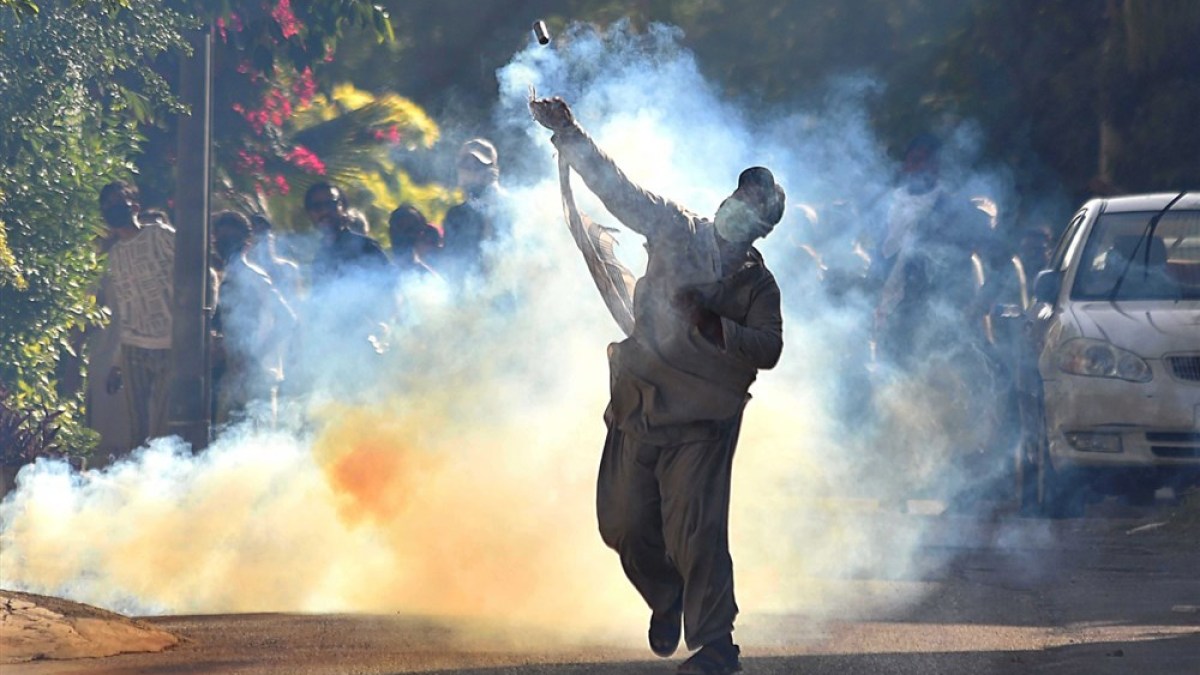EXPLAINER
Nationwide riots on this ‘dark day’ last year triggered a months-long political crisis that saw ex-PM Imran Khan jailed, and a crackdown on his party.
The Pakistan Tehreek-e-Insaf (PTI) party has scheduled rallies all across the country on Thursday to mark a year since the arrest of its leader and former Prime Minister Imran Khan.
Cricketer-turned-politician Khan was arrested on this day last year, triggering a political crisis that lasted for months, which saw the PTI chief imprisoned again in August on several serious charges and a government crackdown on his party.
Khan, 71, remains embroiled in a slew of cases in which he has been convicted, and is currently lodged in Rawalpindi town’s Adiala jail.
Here’s a recap of the lead-up to Khan’s May 9, 2023 arrest, and the key events that transpired since:
2022
April 10: Khan loses a no-confidence vote in parliament, forcing his removal from power. He alleges a United States-backed conspiracy to sack him. Rival Shehbaz Sharif of the Pakistan Muslim League-Nawaz (PMLN) party becomes the prime minister. The US has denied any role in Khan’s removal from power.
October 21: The Election Commission of Pakistan disqualifies Khan as a member of parliament after finding him guilty of “corrupt practices”, two months after he is charged in the state gifts case, which relates to him allegedly selling gifts he received from foreign countries when he was in power.
November 3: An assassination attempt is made on Khan while he is leading a protest in Wazirabad city in Punjab province to demand snap elections.
2023
May 9: Khan is arrested in a corruption case while making a court appearance in capital Islamabad, triggering nationwide protests by his supporters who blame the military for orchestrating the arrest. The military has consistently denied any role in Khan’s legal or political troubles.
May 11: Amid deadly protests led by PTI, Pakistan’s Supreme Court says Khan’s arrest is illegal, ordering his immediate release.
May 17: Authorities allege that Khan is hiding May 9 rioters in his residence in Lahore. Pakistan’s National Security Committee approves the military’s decision to try the arrested protesters in military courts.
August 5: Police arrest Khan in Lahore after an Islamabad court sentences him to three years in prison for illegally selling state gifts.
August 6: Pakistan’s election panel bars Khan from politics for five years following his conviction in the state gifts case.
August 9: President Arif Alvi dissolves the country’s National Assembly, the lower house of parliament, paving way for elections.
August 14: A caretaker government takes office under Prime Minister Anwaar-ul-Haq Kakar.
August 20: Khan’s close aide and former Foreign Minister Shah Mahmood Qureshi is arrested in the state secrets or cypher case – which refers to the leaking of a secret diplomatic cable Khan alleges proves his charge that the US was involved in his removal from power.
October 21: Former Prime Minister Nawaz Sharif, Shehbaz Sharif’s elder brother, returns to Pakistan from self-exile in the United Kingdom. A few days after his arrival, the Islamabad High Court grants him bail in several corruption cases.
October 24: A five-member Supreme Court bench declares the military trial of civilians in May 9 cases unconstitutional.
November 21: Islamabad High Court declares Khan’s in-jail trial illegal, striking down his indictment in the cypher case.
December 14: A six-member bench of the Supreme Court upholds an appeal by the government against its October 24 ruling. This allows the military trial of the May 9 accused to continue.
2024
January 13: Khan’s PTI is banned from using the iconic cricket bat symbol for not holding intra-party elections. PTI-backed candidates are forced to contest the elections as independents.
January 30: Khan is sentenced to 10 years in jail in the cypher case.
January 31: A court in Rawalpindi sentences Khan and his wife, Bushra Bibi, to 14 years in the state gifts case.
February 3: Another court in Rawalpindi sentences Khan and Bibi to seven years, ruling that their marriage violated Islamic law.
February 8: Pakistan holds parliamentary and provincial elections. PTI alleges widespread vote rigging — accusations that the government denies.
February 13: PMLN and Pakistan People’s Party (PPP), along with other allies, form the government despite PTI-backed MPs emerging as the single largest bloc in parliament.
March 11: Police arrest more than 100 PTI supporters protesting against alleged rigging in the election.
April 1: Islamabad High Court suspends jail sentences of Khan and Bibi in state gifts case.
May 8: Bibi, who was under house arrest at Khan’s Bani Gala residence in Islamabad, is moved to Adiala jail.
Check out our Latest News and Follow us at Facebook
Original Source

